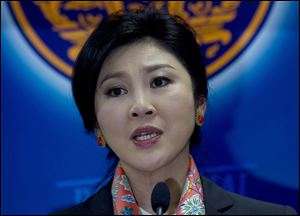
EDITORIAL
Fractured Thailand
5/16/2014
Yingluck
Unless you believe that the best government is no government, the situation in Thailand is close to catastrophic.
Against a backdrop of failed and disputed elections, and a standoff among the elected government, political protesters, and partisan courts, Prime Minister Yingluck Shinawatra and nine ministers were forced to resign last week. That left the country to be governed by an interim prime minister and civil servants.
The political dispute in the southeast Asian nation is between so-called red shirts and yellow shirts. The red shirts are for the most part rural supporters of the Shinawatra family, led by Ms. Yingluck’s exiled billionaire brother, Thaksin. Every time in recent years that Thailand has held elections, the red shirts have won.
This outcome is unacceptable to the yellow shirts, who are for the most part urban, based in Bangkok, and somewhat more modern in their outlook. They are also attached to Thailand’s monarchy, led by King Bhumibol Adulyadej, who is ailing and declining to exercise his remaining authority to restore order.
Faced with past political disorder, Thailand’s armed forces have sometimes intervened, imposing military rule until the country’s civilian politicians worked out a reasonable status quo for governing. This time, they have let the political parties mill around fruitlessly, without stepping in to overthrow the country’s ostensible democracy. The next key moment is elections scheduled for July.
You can argue that Thailand’s internal political situation does not matter much to the United States. At the same time, its 67 million people cannot go without government for long. And Thailand has been a linchpin of reason and stability in a region of much economic and political interest to America, which is pivoting its attention to Asia.